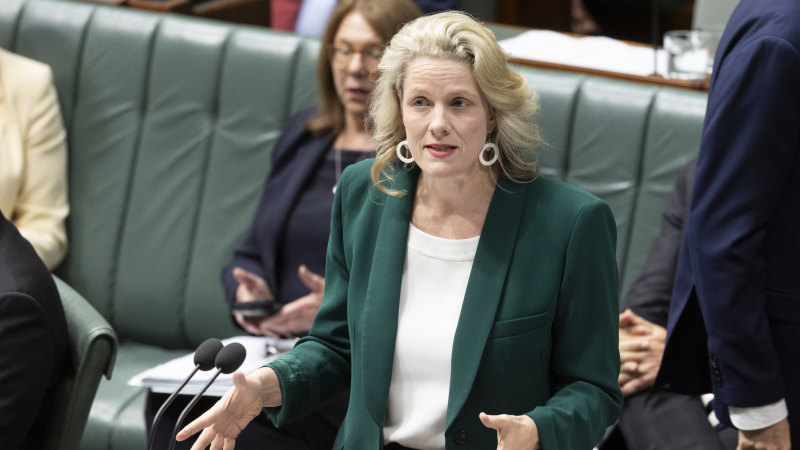Save articles for later
Add articles to your saved list and come back to them any time.
The 83 detainees released from immigration detention could be subject to stricter conditions such as curfews, wearing ankle bracelets, and jail sentences if conditions are breached under the government’s emergency legislation.
Home Affairs Minister Clare O’Neil said early on Thursday morning the opposition would be briefed on the legislation which will increase the Commonwealth’s powers over the detainees’ release conditions following the High Court decision last week that indefinite detention was illegal.
Home Affairs Minister Clare O’Neil will introduce legislation responding to the High Court’s decision on immigration detention.Credit: Alex Ellinghausen
“Today our government will introduce tough new laws into our parliament that will give the Commonwealth the power to put in place very strict visa conditions, new visa conditions that will help us ensure that the community is kept safe during this time,” she said.
“These conditions are very significant, they include the ability of the Commonwealth to impose ankle monitoring bracelets on people who have been released from detention. They include the power for the Commonwealth to impose very strict curfews on people who have been released from detention.”
O’Neil said the new laws would also have criminal sanctions imposed on anyone who broke their visa conditions.
“There are jail terms attached to the end of that, so for the people who are released from detention … we have a simple message for them: we will set the strictest possible conditions for you, if you do not follow them you will end up back in jail.”
The announcement follows a week of sustained political pressure for the government as it struggled to explain what measures it had put in place to ensure community safety following the release of 83 detainees.
In ferocious scenes in parliament on Wednesday, Prime Minster Anthony Albanese and Opposition Leader Peter Dutton clashed when Dutton moved a motion that raised concern about a rise in antisemitism while also demanding the government “bring forward any legislation necessary to neutralise the threat posed by the hardcore criminals”.
Albanese said Dutton had attempted to “weaponise antisemitism in this chamber and make it a partisan issue” and that the opposition sought to link antisemitism to the High Court decision.
Opposition home affairs spokesman James Paterson said the government’s emergency legislation did not go far enough.
Paterson described the 18-page-long proposed law changes as the “bare minimum”, arguing the measures to increase restrictions on those released should have been put in place last week.
“What we are looking at is whether any amendments can be moved in the short time that we have this morning to strengthen this bill, to actually offer some meaningful protections to the community,” he said.
“The government doesn’t seem willing to test the proposition that, for example, a high-risk terrorist offender regime could be applied to some of this cohort; that a preventative detention order could be applied or a control order could be applied or a continuing detention could be applied.”
Cut through the noise of federal politics with news, views and expert analysis from Jacqueline Maley. Subscribers can sign up to our weekly Inside Politics newsletter here.
Most Viewed in Politics
From our partners
Source: Read Full Article

